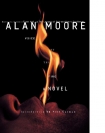Voice of the Fire by Alan Moore (pocket ebook reader .txt) 📗

- Author: Alan Moore
Book online «Voice of the Fire by Alan Moore (pocket ebook reader .txt) 📗». Author Alan Moore
The undertown is out of bounds. The sacred space has been co-opted by Civil Defence contingencies: the bunkers of nuclear-exempted bureaucrats, the dressing rooms where they will underwrite the Apocalypse. No more may we peel back the flagstones to reveal the cadavers of murdered saints, bones marrowed with appalling light. Cold certainty replaces visionary speculation. Thus displaced, the landscape’s secret soul moves elsewhere, a fallback position that can be successfully defended. The mystery retreats behind its oldest bulwarks; seeks the highest ground.
In the Briar Hill estate just down from Hunsbury Hill neolithic remains were discovered, predating the leavings of the Bronze and Iron Age found further up slope. Fred’s vaguely suspect vehicle crawls through the narrow, winding roads between the housing blocks; avoiding areas where the yellow Neighbourhood Watch stickers are the thickest, he parks in a silent close.
On foot through the estate and up towards the relic Iron Age camp, with Leah striding through the snow ahead, face rattling and chiming, mournful music in the gloom. She talks about a dream she had some weeks ago in which she found her bedroom occupied by a colossal coal-black dog, its horse-sized form slumping across a bed too small for it, wheezing and straining in the throes of labour yet too enervated to give birth. She had to reach inside and pull the monstrous Shagfoal puppies out into the light, at which the dream mutated and she was in hospital, having just given birth herself to these blind horrors and yet filled with a maternal pride and overwhelming love for her repulsive children. She showed them off to visitors, who looked up from the cradle speechless with distress. Cot death. Her newborn blackdog babies all lay stiff and chill. She woke up racked by helpless tears of loss.
The black dogs sniff around the book’s periphery, nose through the nightmares of those closest to the author as the text and its phantasmal hounds alike draw closer to the brink of actuality. Shagfoals are seldom seen these days outside of dream. A solitary sighting in the 1970s: a motorist on the A45 found a massive shadow-dog big as a pony keeping pace with his fast-moving vehicle as it raced through the fields beside the road. Since then, though, not a glimpse. Half-real perhaps, or only solid intermittently, a creature out of Borges’ bestiary that pads through the shifting wastelands at the edge of form, perpetual firelight in its flaring eye.
The Briar Hill houses are a labyrinth in the descending dusk, made unfamiliar by their powdering of snow. At last the huge white circle of the strip-mined camp presents itself, ringed round by ditch and looming ash tree, stark against the failing light. An eerie silence. Nothing stirring in the clustered homes beyond the treeline. Maybe everybody’s gone.
Why did its Iron Age inhabitants abandon this place with such haste that all their brand-new corn querns were left behind? Not fire. Not plague, nor flood, nor the attack of wild beasts. Not the Romans. Something happened here. A settlement of sixty or so people tumbled out of history and into myth, more victims of the worryingly flimsy border-territories separating those two states.
Off in the twilight, men are laughing. Something runs down from the rim of the raised ditch and sits down in the snow, there in the empty campsite.
Peer myopically, then turn to Fred. ‘What’s that?’
He frowns, trying to focus through the half-light, red brows knit. ‘A dog.’
‘What colour?’
Further scrutiny of the still-seated and unmoving form, that neither barks nor growls.
‘Black, by the look of it.’
Two men burst from the cover of the trees, run laughing down the slope to where the shape waits motionless. One of them picks it up and slings the limp, inert weight of the animal across his shoulder, like a sack. The pair then race off chuckling across the frozen site, engulfed by shadows on the far side, gone from view. Was that a dog? If not, how did it run downhill and thirty feet across the field? Some time, thing change and come like other thing. Here, in this gloaming no man’s land dividing dark from day, the chasm yawns between what happened and what never was. The certainties of history fall in, are swallowed whole. Only the anecdote, only the tale remains.
At length, we file out from the site bewildered. Past the trees, a classic view of the recumbent town, seen from the spot at which the earliest line engravings of the place were executed, although with the subject much changed between sittings. Then, church spires ruled a small cluster of low buildings. Now, a field of Pernod-coloured stars, a luckless constellation grounded by inclement weather.
Eastward is the shimmer of the new developments that have doubled Northampton’s size and population over fifteen years. Blackthorn and Maidencastle, named nostalgically after whatever natural feature was paved over to create them. Bellinge. Rectory Farm and Ecton Brook. A former Eastern Bloc now simmering with malice: crack, and guns, and flamed-out cars.
Towards the west, the jaundiced earthglow of Northampton’s epicentre, of the splashpoint from which the great slow rings of brick and mortar rippled out. Everything is visible from here. Lift up both hands before your face to either side and you can hold the town, its lights strung in a cat’s-cradle between the outstretched fingers. Pubs and terraces. Neglected cinemas, adapted and transformed. The traffic moves, a constant toxin, through the over-burdened arteries. The cold and bright heart falters, clots of neon accumulated in the valves, but carries on, the coronary averted for the moment, a postponement only.
Drive





Comments (0)